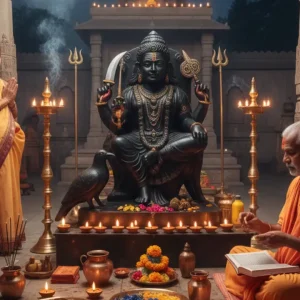The festival of Ram Navami holds a special place in the hearts of millions. It marks the birth of Lord Rama, an embodiment of righteousness, courage, and compassion. Celebrated with devotion, Ram Navami reminds people of the values that shape a fulfilling life.
The Significance of Ram Navami
Ram Navami falls on the ninth day of the Chaitra month in the Hindu calendar. It coincides with the end of Chaitra Navratri, a period of spiritual reflection and worship. For Hindus, this day symbolizes the victory of good over evil and the power of truth.
Devotees believe that Lord Rama’s birth brought hope during a time of darkness. His life, as described in the Ramayana, inspires people to live with integrity and compassion.
The Story Behind Lord Rama’s Birth
According to the Ramayana, King Dasharatha of Ayodhya longed for a child. Despite performing numerous rituals, his prayers remained unanswered. The revered sage Rishi Vashishtha advised him to perform the Putrakameshti Yagna, a special fire ritual for seeking offspring.
During the yagna, a divine being emerged from the flames holding a bowl of sacred kheer (sweet rice pudding). The king was instructed to distribute the kheer among his three queens — Kaushalya, Kaikeyi, and Sumitra. Soon after, Queen Kaushalya gave birth to Lord Rama, Kaikeyi to Bharata, and Sumitra to Lakshmana and Shatrughna.
This miraculous birth is seen as the arrival of divine energy destined to restore dharma (righteousness).
Why Lord Rama’s Birth Is So Revered
Lord Rama is considered the seventh avatar of Lord Vishnu. His life represents ideal values — as a son, brother, husband, and king. People admire his unwavering commitment to truth and duty.
His birth signifies hope, strength, and the power of righteousness. Many households still teach children the virtues of Lord Rama, encouraging honesty, respect, and kindness.
How Ram Navami Is Celebrated
Ram Navami celebrations vary across India. However, common practices include:
Fasting and Prayers: Devotees observe fasts and visit temples to offer prayers. Some consume only fruits and milk throughout the day.
Ramayana Recitations: Many devotees read or listen to the Ramayana, recalling the life and teachings of Lord Rama.
Rath Yatra (Processions): Grand processions featuring Lord Rama’s idol are common in several regions. Devotees chant bhajans and sing praises during these events.
Decorated Temples and Homes: Homes and temples are adorned with flowers and lights. Special pujas are held with offerings of fruits, sweets, and flowers.
Charity and Service: Acts of kindness, such as feeding the needy, are encouraged on this sacred day.
Spiritual Lessons from Lord Rama’s Life
Ram Navami is not just a celebration but a reminder of valuable life lessons. Here are some key teachings that can guide daily life:
1. Duty Before Self
Lord Rama’s decision to leave Ayodhya and live in exile reflects his commitment to dharma. He honored his father’s promise, even when it meant sacrificing his own comfort.
Life Lesson: Keeping promises, no matter how difficult, builds trust and respect.
2. Respect for Relationships
Lord Rama’s bond with his brothers, especially Lakshmana, reflects loyalty and love. He valued family ties and showed deep respect to elders.
Life Lesson: Strong relationships thrive on respect, care, and mutual support.
3. Courage in Adversity
Despite facing numerous challenges, Lord Rama stood firm in his values. His patience and bravery during difficult times inspire people to stay strong in moments of hardship.
Life Lesson: Facing problems with courage helps build inner strength.
4. Compassion and Forgiveness
Lord Rama showed compassion even towards his enemies. After defeating Ravana, he performed his last rites with dignity, acknowledging his greatness as a scholar.
Life Lesson: Forgiveness brings inner peace and strengthens relationships.
Rituals to Perform on Ram Navami
For those observing Ram Navami at home, these steps can enhance the spiritual experience:
Clean Your Home and Create a Sacred Space: Decorate a corner with Lord Rama’s idol or picture.
Offer Prayers and Chant Mantras: The ‘Om Sri Ramaya Namah’ mantra holds special significance on this day.
Read the Ramayana or Sundarkand: These texts inspire strength and positivity.
Prepare Prasad (Holy Offering): Traditional sweets like panakam, kheer, and fruits are commonly offered.
Practice Acts of Kindness: Donating food or helping those in need reflects Lord Rama’s spirit of compassion.
Why Ram Navami Still Matters Today
In today’s fast-paced world, Lord Rama’s values remain more relevant than ever. His life teaches patience, respect, and self-control — virtues that can improve personal and professional relationships.
People facing challenges often draw strength from his unwavering belief in righteousness. By applying his teachings, anyone can build inner peace and stronger connections with others.
Engaging Children in Ram Navami Traditions
Introducing children to Ram Navami traditions can be a meaningful experience. Activities like storytelling sessions, drawing competitions, or simple plays based on the Ramayana can help children understand Lord Rama’s virtues.
Families can also involve children in preparing prasad, decorating the puja space, or participating in charity drives.
Embracing the Spirit of Ram Navami
Celebrating Ram Navami is not limited to rituals alone. Embracing Lord Rama’s values in everyday life strengthens character and improves relationships. By practicing truth, kindness, and compassion, one can experience greater peace and purpose.
How do you celebrate Ram Navami with your family? Are there special traditions you follow? Share your thoughts in the comments below!





